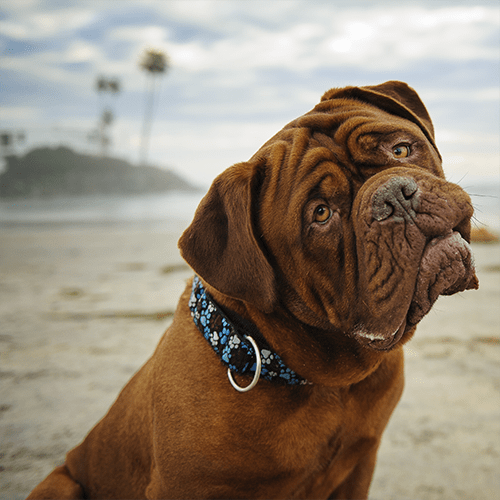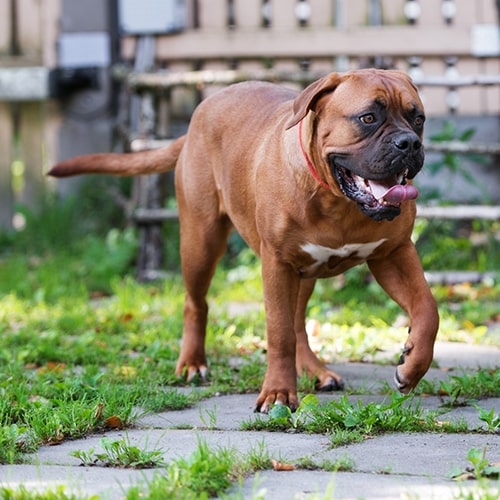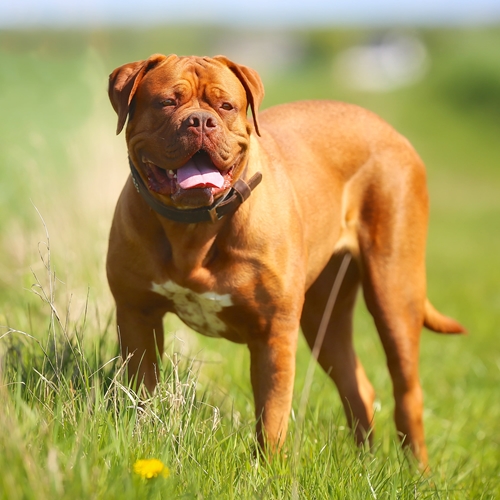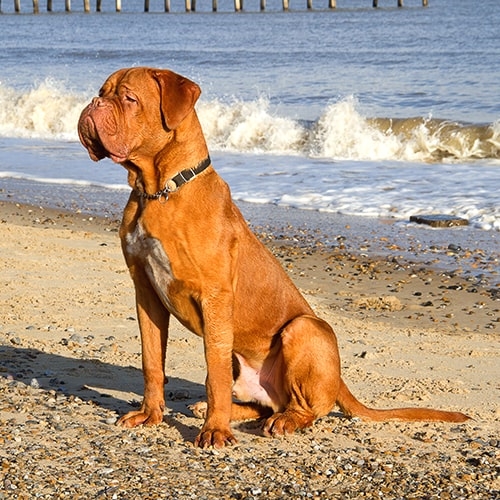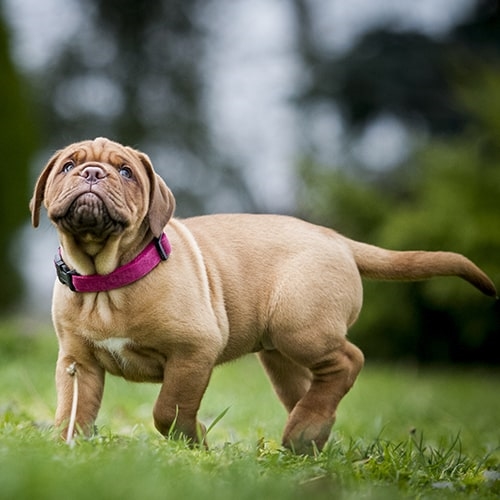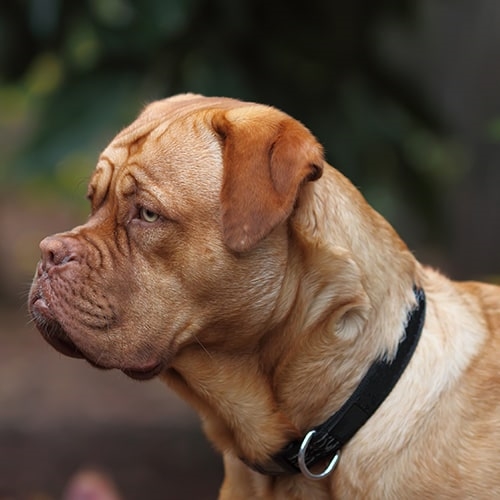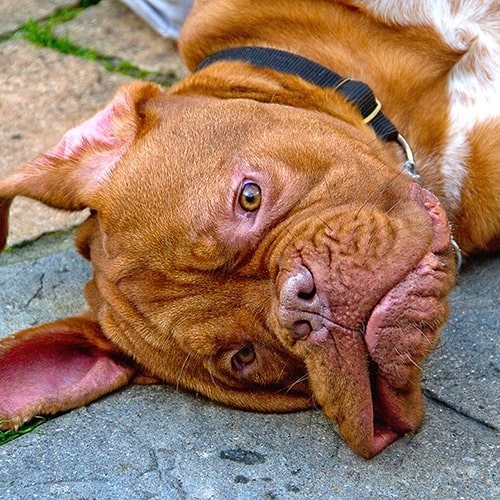| Size | Large |
|---|---|
| Average height | 58-68 cm |
| Average weight | At least 45kg |
| Average lifespan | Over 10 years |
| Minimum exercise (per day) | 1 hour |
| Coat length | Short |
| Minimum cost (per month) | £105 |
The Dogue de Bordeaux is a large but laid-back dog. They form very strong bonds with their owners and families and are therefore very loyal. They make good watch dogs as they love to bark and are quite intelligent.
Dogues may look intimidating but they are real softies. They can be very affectionate towards their families. They can be a little difficult to handle at times so some experience with the breed would be a real advantage before getting one.
Common health problems in Dogue de Bordeaux
Dogues are very handsome to look at, but unfortunately their wrinkly faces have been selectively bred and have developed to cause health issues. Often, Breed Clubs will also be able to provide advice on what tests your breed may need and where to get these done. Usually the parents of your puppy should have been health screened for certain disorders, so make sure you ask your breeder about this.
Dogue de Bordeauxs are amongst a group of breeds classed as ‘Category Three’ by The Kennel Club. This means that these breeds of dog have been bred over many years to look a certain way but that these changes to the way they look now cause them health problems. For the Dogue de Bordeaux, this refers to their excessive skin folds which can easily get dermatitis (a problem with their skin), their undershot jaws, their sometimes-nervous character, and a tendency towards having weak back legs.
If you want to minimise the risk of your dog getting problems due to exaggerated features, read our advice on choosing a pedigree dog.
Some of the health conditions your Dogue de Bordeaux may develop include:
- Elbow dysplasia – where the elbow joint that doesn’t fit together perfectly, which will eventually lead to arthritis – before breeding, dogs should be screened by x-rays through the BVA/Kennel Club Hip Dysplasia Scheme.
- Hip dysplasia – where the hip joint that doesn’t fit together perfectly, which will eventually lead to arthritis – before breeding, dogs should be screened by x-rays through the BVA/Kennel Club Hip Dysplasia Scheme.
Caring for your Dogue de Bordeaux
Dogues can make great pets if they have owners who are extremely dedicated to managing their exercise, training and any potential health problems. Owners need to have a very secure garden and keep an eye on their Dogue if it’s in the garden as they can jump surprisingly high.
We wouldn’t recommend Dogues for first-time owners as they can be challenging to handle and train due to their size and personalities. Due to their size and strength, we also wouldn’t recommend Dogues for families with young children or vulnerable adults as they can easily knock them over or injure them accidentally.
Dogue de Bordeaux and barking
As with any dog, a Dogue de Bordeaux is likely to make noise. Every dog is different and even two dogs of the same breed may make different amounts of noise. That said, many Dogue de Bordeauxs will bark at passers-by or anyone who comes to the door. If you’re having problems with excessive noise and barking, we recommend seeking the advice of an accredited behaviourist.
Training and socialisation
Dogues are very intelligent and respond well to positive, reward based training. They can be strong willed, though, so you’ll need to be persistent with training. If you aren’t an experienced trainer, or are a first time dog owner, then you should ask for the help of an accredited trainer.
Like other breeds, Dogues need to be well socialised to make sure they develop into great pets. It’s important to make sure that you pick a puppy with a good temperament, as some families in the breed may be more prone to being nervous. A confident puppy that’s had a wide variety of experiences from an early age is more likely to grow into a well-adjusted, friendly pet.
Dogues shouldn’t be too destructive if you need to pop out and leave them alone for short periods, but this should never be for any longer than four hours. Make sure you leave them with a toy or puzzle that they can safely play with on their own.
Exercise
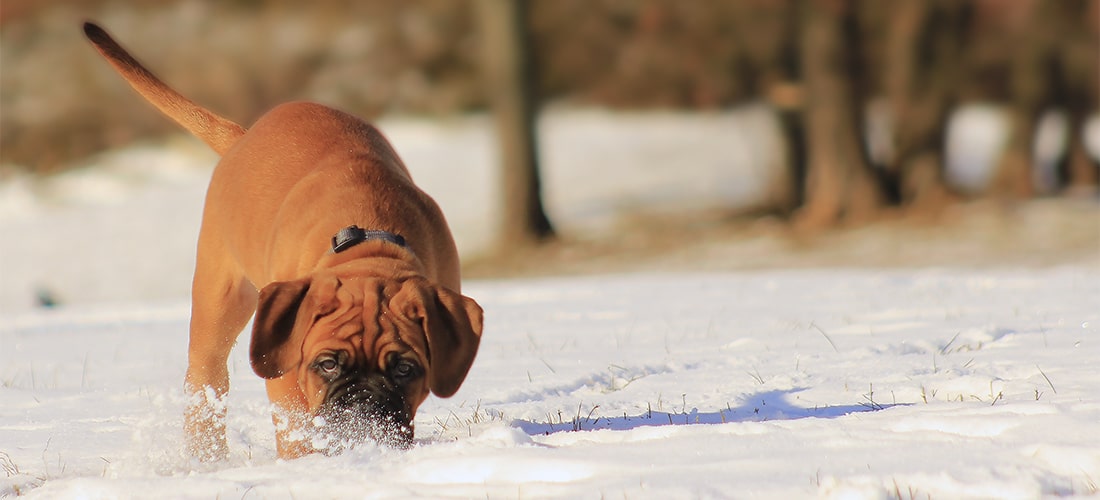
Although they’re happy to kick back, Dogue de Bordeaux are no couch potatoes! We recommend giving your Dogue a minimum of an hour exercise every day. They enjoy being taken on several walks, but you’ll also need to allow for playtime and training on top of this. They like to have lots of things to do, so rotate their toys regularly to stop them from getting bored.
Grooming
The Dogue de Bordeaux has a fairly low maintenance coat and a weekly brush should be plenty. You’ll also need to be prepared for a lot of drool.
You’ll need to clean the folds on their face regularly to stop sores and infections with a soft damp cloth. Make sure you dry them thoroughly so bacteria and yeast doesn’t have a nice moist environment to grow.
You’ll also need to keep an eye on their ears and make sure they are kept clean and free of any nasties. You can clean your dog’s ears at home yourself but it’s best to check with your vet how often and what you should use as this can vary and cleaning them too often can also cause problems.
Dogue de Bordeaux and children
The Dogue de Bordeaux, given the right socialisation and training, is a gentle dog. They generally get along well with older children, although due to their size we wouldn’t recommend having one if you have smaller children in case they accidentally hurt them by knocking them over. As with every breed, you should always teach children how to approach and play with dogs with care and kindness.
Adults who aren’t used to such a large breed will also need to be careful around Dogues. Always supervise children and vulnerable adults with your Dogue de Bordeaux and make sure you can recognise the signs of unhappiness or anxiety in your dog to help avoid any conflicts.
Dogue de Bordeaux and other pets
Given the right socialisation from a young age, Dogues should generally get along fine with other dogs.
Many Dogue de Bordeaux have a very high prey drive so we wouldn’t recommend keeping them with other cats or other small pets. They may be able to live with another smaller pet they have grown up with, but never leave them alone together.
Food
Your Dogue de Bordeaux’s diet will vary depending on their age and any health conditions they may have. You’ll need to feed them a complete, balanced dog food to keep them slim and healthy.
Your vet will be able to tell you how much your dog should be eating. You should feed them a good quality, commercially available and complete dog food and it’s usually recommended to split their daily allowance into two meals. If you give your dog an occasional treat or use treats for training, remember to take this into account and reduce their daily allowance. Treats shouldn’t make up more than 10% of their daily calorie intake as it could unbalance their diet.
You should try to feed your dog at the same time every day to get them into a routine. Remember to leave a gap after eating and before exercising.
The cost of owning a Dogue de Bordeaux
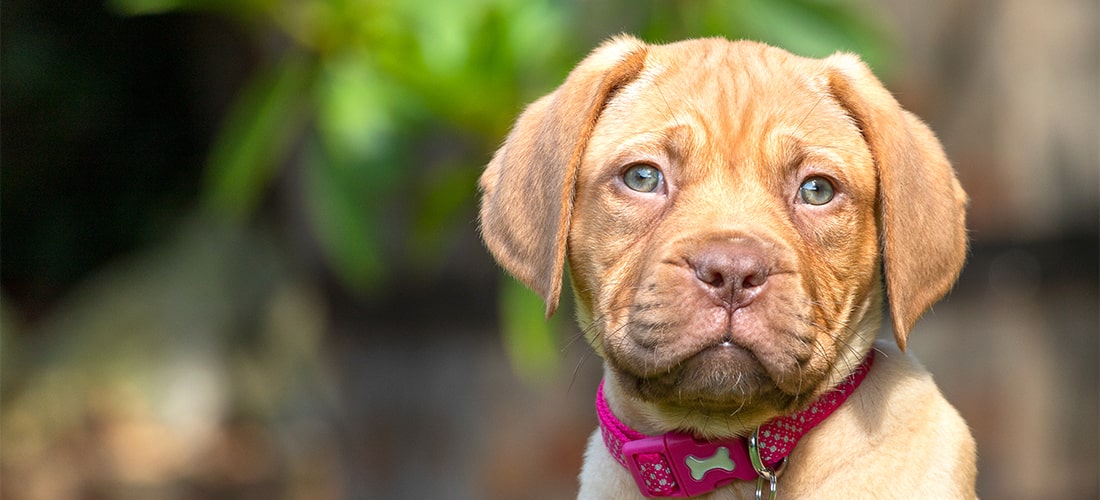
Having a Dogue de Bordeaux will cost a minimum of £105 per month after purchase and set-up costs and over £17,000 across their lifetime.
Costs you’ll need to think about include:
Purchase costs
Adopting an adult dog from a rescue centre may be a more cost-effective option, with the added advantage of giving a home to a pet without one – check if the rehoming centre you’re looking at asks for a donation for rehoming.
If instead you’re buying a Dogue de Bordeaux puppy from a breeder, you’ll need to factor in this cost. Beware unusually cheap puppies as they could come from a puppy farm. If you’d like to buy a pedigree puppy, we recommend looking for a Kennel Club Assured breeder. These breeders must do extra health tests and meet high standards.
Set up costs
- Puppy vaccines – if you rescue a dog, reputable centres will often vaccinate them for you. Remember that ongoing booster vaccinations will be needed to continue their immunity.
- Neutering – you should usually arrange for your dog to be neutered at around 6-12 months old, though your vet will be able to advise you exactly when is best. Check prices at your local practice as these will depend on your vet and where you live. Some rescue centres will neuter any dogs they rehome, saving you this cost.
- Equipment – including a collar and tags, lead, harness, dog beds, dog bowls, pet-safe toothpaste and toothbrushes, grooming brushes and toys. Keep in mind that all these will need to be replaced with wear or damage or if your dog outgrows or damages them!
Ongoing costs
- Food.
- Preventive healthcare – budget for routine vet visits to help stop your dog getting ill and catch any problems early. They need annual check-ups, vaccinations and regular flea and worming treatments. Check if your vet offers a health care plan as this can help spread the cost throughout the year.
- Vet bills* or pet insurance – if you don’t have pet insurance and your dog needs veterinary treatment for an injury or illness, costs can rapidly mount up. Check what’s covered and what isn’t when comparing policies.
- Accessories – including lots of poo bags, replacing worn toys and grooming accessories, buying doggy toothpaste and any other extras they might need.
Other costs
- Training – basic training is very important and dogs can benefit from formal classes. Some dogs may have, or develop, behavioural problems which might need professional management.
- Boarding – you may also need to budget for boarding or dog sitting costs if you are planning to go away from home on holiday.
- Dog walkers/day-care – you might consider a professional dog walker to keep your dog happy and healthy if you’re unable to get out with your dog enough yourself, or to look after them during the day if you need to be out for more than four hours.
* It’s always better to plan ahead and budget or get pet insurance in case your pet gets injured or unwell. If you are having difficulty with veterinary costs, you can check if you are eligible for treatment at PDSA here.
If you’re considering pet insurance, our PDSA Pet Insurance could be a great option for you and it’s quick and easy to get a quote online.
Fun facts
- The Dogue de Bordeaux is a French breed and they are often known as French Mastiffs (Dogue directly translates as Mastiff).
- They are claimed to have the largest heads in the canine world (even compared to their large bodies!).
- They were popular with the French aristocracy in the late 1700s and many were killed with their masters during the French revolution.
- They’re a famous breed, with a Dogue de Bordeaux used to play Beasley in Turner and Hooch.
Getting a Dogue de Bordeaux
Do plenty of research before you get a Dogue de Bordeaux. These gentle giants need owners who understand them and give them the care and exercise they need to stay happy and healthy. As they’re both large and can be hard to handle, we wouldn’t recommend getting one unless you’re absolutely ready to take on this breed.
Rehoming centres
There are plenty of rescue centres across the country where you may find a Dogue de Bordeaux. Breed-specific rescues that specialise in Dogues are out there too. You’ll need to ask any rescue centre about the dog’s history to make sure they will be comfortable in your home. Good rescue centres should let you know of any health and behaviour problems.
Breeders
If you buy from a breeder, make sure your puppy will be well socialised and have all necessary health checks and vaccinations. We recommend looking for a Kennel Club Assured breeder as they meet higher standards. We’ve put together some advice to help you find a good breeder.

